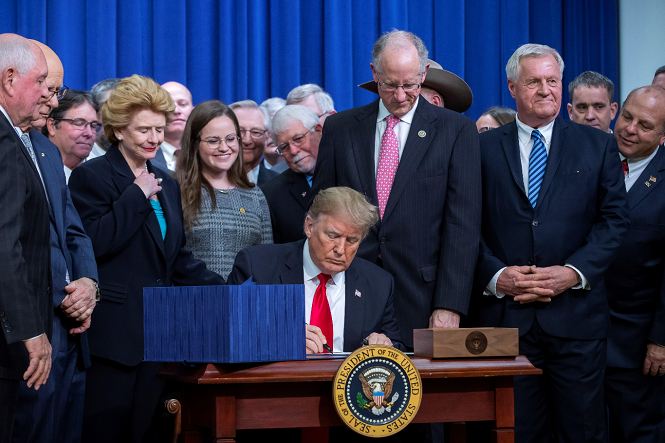21 de diciembre 2018

The Return of the Military

PUBLICIDAD 1M
PUBLICIDAD 4D
PUBLICIDAD 5D
Ros-Lehtinen confirms to Confidential that with the signing any official or former official of the Ortega Government since 2007 is subject to sanctions

Donald Trump signed on Thursday the Nica Act, which establishes harsh political and economic sanctions by the United States against the regime of Daniel Ortega and Rosario Murillo.
With Trump’s signature the legislation takes effect, which will bring individual sanctions for the regime’s representatives, as well as conditioning loans to the Government by international financial institutions such as the World Bank (WB), the International Monetary Fund (IMF) and the Inter-American Development Bank (IDB).
The law, which passed unanimously in the US Senate and Congress, is a merger of the initially proposed Nica Act promoted by Congresswoman Ileana Ros-Lehtinen, an amendment by Republican Senator Ted Cruz and another by Democrat Bob Menendez.
It also includes an addition from Senator Marco Rubio directed against the accomplices and friends of the regime.
The law also known as “Magnitsky Nica” has the official name of the Human Rights and Anticorruption Law of Nicaragua S. 3233.
On November 27, the US government imposed sanctions on Vice President Rosario Murillo and the closest collaborator of the presidential couple, Nestor Moncada Lau, including them on the list of the Office of Foreign Assets Control (OFAC, for its acronym in English).
At the same time, President Trump termed the crisis in Nicaragua as “an extraordinary and unusual threat to US national security.”
“I, Donald Trump, as President of the United States, consider that the situation in Nicaragua constitutes an extraordinary and unusual threat to national security and US foreign policy and, therefore, I declare a national emergency to deal with this threat,” stated the executive order.
National Police Chief Francisco “Paco” Díaz, (then the acting head); Fidel Moreno, secretary of the Mayor’s Office of Managua, and Francisco “Chico” Lopez, vice president of Albanisa, president of Petronic and treasurer of the FSLN, were also punished in July for violating human rights and being involved in acts of corruption.
The three officials, belonging to the inner circle of maximum trust of the presidential couple, joined the former president of the Supreme Electoral Council, Roberto Rivas, who was the first sanctioned by the US in December 2017.
The effect of the sanction is to freeze all assets in the United States of those sanctioned, and prohibit any kind of commercial and financial transaction, through sanctions applied by the Treasury Department.
The impact of the Nica Act
“It is a devastating blow,” said former Foreign Minister Norman Caldera, when the legislation won approval of the Congress.
“You can hardly keep getting more pressure. This is a pressure cooker to which you are not only increasing the heat, but pressure all sides, “said Caldera.
The Nica Act merged with the amendments of Senators Ted Cruz, Bob Menéndez and Marco Rubio. It establishes not only the conditioning of loans for Nicaragua in multilateral organizations but will impose sanctions on officials and ex-employees of the Ortega Murillo regime involved in human rights violations, acts of corruption, undermining of democratic institutions, expropriation of public or private property, and the illegal arrest or prosecution of citizens.
The new law is added to the Executive Order, described by Caldera as an action that “expands the circle to include US citizens, companies, Nicaraguans residing in the United States that were not previously in the previous sanctions. It also extends the definition of punishable persons to include accomplices,” he explained.
Caldera maintained that among the “accomplices” of the Nica Act (also called Magnitsky Nica) are those who give false testimonies in trials against citizens accused of terrorism, organized crime, murders, among other crimes to criminalize their participation in the protests against the dictatorship.” He warned that “judges and others who apply the law incorrectly are also accomplices.”
The Nica Act urges that, within 180 days after its approval, the Secretary of State present to the corresponding Congressional committees a report on the participation of senior officials of the Government of Nicaragua in human rights violations, significant acts of corruption and money laundering. It includes members of the Supreme Electoral Council, the National Assembly and the judicial system. In addition, it warns “people who transfer, or facilitate the transfer of goods or technologies for use in or with respect to Nicaragua, if they are used by the Government of Nicaragua to commit serious violations of human rights against the people of Nicaragua.”
PUBLICIDAD 3M
Confidencial es un diario digital nicaragüense, de formato multimedia, fundado por Carlos F. Chamorro en junio de 1996.
PUBLICIDAD 3D